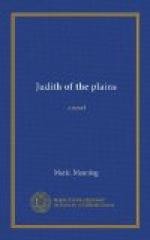The fat lady dropped his arm as if it had been a brand. “He’s no gentleman. As for Mountain Pink, she was drove to it.”
All that day they toiled over sand and sage-brush; the sun hung like a molten disk, paling the blue of the sky; the grasshoppers kept up their shrill chirping—and the loneliness of that sun-scorched waste became a tangible thing.
Chugg sipped and sipped, and sometimes swore and sometimes muttered, and as the day wore on his driving not only became a challenge to the endurance of the horses, but to the laws of gravitation. He lashed them up and down grade, he drove perilously close to shelving declivities, and sometimes he sang, with maudlin mournfulness:
“‘Oh, bury me
not on the lone prairie.’
The words came low and mournfully
From the cold, pale lips of
a youth who lay
On his dying couch at the
close of day.”
The fat lady reminded him that he was a gentleman and that he was driving ladies; she threatened him with her son on Sweetwater, who began, in the maternal chronicles, by being six feet in his stockings, and who steadily grew, as the scale of threats increased, till he reached the altitude of six feet four, growing hourly in height and fierceness.
But Chugg gave no heed, and once he sang the “Ballad of the Mule-Skinner,” with what seemed to both terrified passengers an awful warning of their overthrow:
“As I was going down
the road,
With a tired team and a heavy
load,
I cracked my whip and the
leaders sprung—
The fifth chain broke, and
the wheelers hung,
The off-horse stepped on the
wagon tongue—”
This harrowing ballad was repeated with accompanying Delsarte at intervals during the afternoon, but as Mary and the fat lady managed to escape without accident, they began to feel that they bore charmed lives.
At sundown they came to the road-ranch of Johnnie Dax, bearing Leander’s compliments as a secret despatch. The outward aspect of the place was certainly an awful warning to trustful bachelors who make acquaintances through the columns of The Heart and Hand. The house stood solitary in that scourge of desolation. The windows and doors gaped wide like the unclosed eyes of a dead man on a battle-field. Chugg halloed, and an old white horse put his head out of the door, shook it upward as if in assent, then trotted off.
“That’s Jerry, and he’s the intelligentest animal I ever see,” remarked the stage-driver, sobering up to Jerry’s good qualities, and presently Johnnie Dax and the white horse appeared together from around the corner of the house.
This Mr. Dax was almost an exact replica of the other, even to the apologetic crook in the knees and a certain furtive way of glancing over the shoulder as if anticipating missiles.
“Pshaw now, ladies! why didn’t you let me know that you was coming? and I’d have tidied up the place and organized a few dried-apple pies.”




